|
|
|
Sort Order |
|
|
|
Items / Page
|
|
|
|
|
|
|
| Srl | Item |
| 1 |
ID:
120027
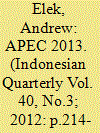

|
|
|
| 2 |
ID:
142025
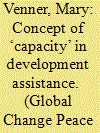

|
|
|
|
|
| Summary/Abstract |
The idea of capacity development has become ubiquitous in discussions of development assistance: a lack of capacity in developing countries is frequently identified as the main obstacle to development and building ‘capacity’ is seen as the most important output of development assistance. The terms ‘capacity development’ and ‘capacity building’ are, however, relatively new in development assistance discourse, having only come into frequent use in the last two decades. This paper examines the history and different uses of the concept of capacity in development assistance literature, tracing its origins and rise in popularity. Although a large amount of material has been produced on the topic there is no clear agreement on what it means, with a range of interpretations used by different authors and in different contexts. The more expansive and ambitious approaches promoted by some development organizations have a number of theoretical and practical difficulties and it is argued that the wide and imprecise use of the term has undermined its usefulness.
|
|
|
|
|
|
|
|
|
|
|
|
|
|
|
|
| 3 |
ID:
148281
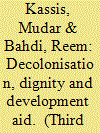

|
|
|
|
|
| Summary/Abstract |
Taking Palestine as the focus of inquiry, and drawing on our experiences as co-directors of Karamah, a judicial education initiative focused on dignity, we reflect on the attributes of colonisation and the possibilities of decolonisation in Palestine through development aid. We conclude that decolonisation is possible even within development aid frameworks. We envision the current colonial condition in Palestine as a multi-faceted, complex and dynamic mesh that tightens and expands its control over the coveted colonial subject but that also contains holes that offer opportunities for resistance or refusal. We turn to Karamah to illustrate how some judges have insisted on a professional identity that merges the concepts of human dignity and self-determination and ultimately rejects the colonial condition inherent in both occupation and development aid. We conclude that in this process of professional identity (re)formation, members of the Palestinian judiciary have helped reveal the demands of decolonisation by demonstrating their commitment to realising human dignity through institutional power, and bringing occupation back into international development discourse.
|
|
|
|
|
|
|
|
|
|
|
|
|
|
|
|
| 4 |
ID:
168476
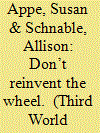

|
|
|
|
|
| Summary/Abstract |
How can support organisations build the capacity of volunteer-driven non-governmental organisations (NGOs)? Citizen aid for relief and development has expanded rapidly in the twenty-first century, and the number of American aid organisations operating in the Global South has grown to nearly 10,000. These grassroots international NGOs – GINGOs – are small-budget, volunteer-driven organisations typically launched by Americans without professional experience in international development or nonprofit management. These groups prize the expressive and voluntaristic dimensions of development work, yet face challenges of amateurism, material scarcity, fragmentation, paternalism and restricted focus. We investigate whether support organisations, whose primary goals are to build the capacity of organisations and strengthen the organisational field, offer solutions to GINGOs’ inherent weaknesses. We draw on 15 semi-structured interviews with a stratified selection of support organisations, including associations tailored towards international development and towards nonprofit work at large. We find that support organisations offer resources to help GINGOs in managerial and administrative domains. Fewer support organisations help GINGOs build technical development skills, and fewer still push GINGOs to critically reflect on their role in development. We find that peer learning and online platforms could help engage GINGOs volunteers in networking spaces, even as their geographic dispersal in the US encourages their fragmentation and isolation.
|
|
|
|
|
|
|
|
|
|
|
|
|
|
|
|
| 5 |
ID:
148061
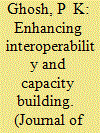

|
|
|
|
|
| Summary/Abstract |
India perceives itself as a net security provider and a balancer of power in the Indian Ocean Region (IOR). This has resulted in the emergence of the Indian Navy (IN) as an important actor in the implementation of India’s foreign policy that embraces a holistic approach towards maritime security cooperation and capacity building. Having overcome its Cold War era isolationistic profile, the IN has expanded its maritime outreach in the IOR and beyond the region. Given that India is perceived as a benign power this has proved to be a strategic advantage in favor of India. The prime driver of increasing role of IN is to counter Chinese moves in the IOR following New Delhi’s discomfort and apprehension with China. To address this, the IN has been conducting regular joint exercises for enhancing interoperability, largesse towards weapon inventory, port visits and coordinated patrols, and assistance. In addition, the IN follows a cooperative approach for sharing of security-related technology. In this manner, the IN has successfully furthered India’s foreign policy objectives while achieving its maritime and strategic aims.
|
|
|
|
|
|
|
|
|
|
|
|
|
|
|
|
| 6 |
ID:
137423
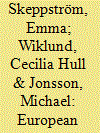

|
|
|
|
|
| Summary/Abstract |
With European Union Training Missions (EUTM) Mali and EUTM Somalia, the EU seeks to stabilize countries facing state weakness caused by intrastate conflict. While the EU formally promotes security sector reform (SSR) through its foreign policy, the EUTM missions in Mali and Somalia in one sense can be described as “counter-insurgency by proxy” as military trainees combat local insurgencies shortly upon graduation. This raises the question whether the EUTM missions are consistent with SSR aims, such as creating a security sector that is legitimate, sustainable, and under civilian control, or inadvertently risk contributing to negative side effects in the medium term. Based on extensive interviews in Belgium, Kenya, Mali, Sweden, and Uganda with personnel who either served in or planned these missions, this study analyses factors which hinder the EUTM concept from being fully consistent with SSR and identifies possible policies to ameliorate the risk of unintended side effects.
|
|
|
|
|
|
|
|
|
|
|
|
|
|
|
|
| 7 |
ID:
134342
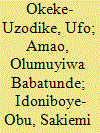

|
|
|
|
|
| Summary/Abstract |
This article interrogates the continuing relevance of the contractarian governance paradigm to resource governance and the impact of exploitation on the local population and environment in the Democratic Republic of Congo (DRC), Zimbabwe and Ghana. It highlights the susceptibilities of their governance processes, particularly the roles of the elites of the host communities, the multinational corporations, and the governing authorities in appropriating resources for their personal interests, resulting in tensions and conflicts. This scenario is borne out of inept leadership, as well as the defective and compromised administrative mechanisms operational in these countries. In view of this, the article underscores the need for a ‘new governance management paradigm’ anchored on a communitarian framework, which incorporates all stakeholders, to guarantee sustainable peace and prosperity, particularly in conflict zones. The article therefore concludes that achieving a nexus between forestry, mining activities and economic development in these countries will require a restructuring of the existing governance mechanisms; and advocates for a new governance model capable of curbing the excesses of local and foreign hegemony, including a total overhaul of the seemingly compromised supervising authority.
|
|
|
|
|
|
|
|
|
|
|
|
|
|
|
|
| 8 |
ID:
189874
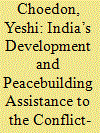

|
|
|
|
|
| Summary/Abstract |
The rationale for India’s development and peacebuilding assistance and the mechanisms employed have changed over the period. India’s assistance is starkly different from the way the developed countries do peacebuilding. This difference is due to India’s different historical experiences, socio-economic conditions and lived experience. The conflict-affected states have appreciated India’s assistance due to the suitability and appropriateness of technical assistance, training and educational programs to their socio-economic context. India’s ways of development and peacebuilding assistance have similarities with the 2016 UN concept of ‘sustaining peace’, which has been formulated to liberate peacebuilding from the strict limitation to post-conflict contexts. However, both the western and non-western donors have a certain reservation about ‘sustaining peace’ concept, for different reasons. The way forward to implement the UN ‘sustaining peace’ is to facilitate both the western and non-western donors to learn lessons from each other’s experiences and view their varied approaches as complementary rather than contradictory.
|
|
|
|
|
|
|
|
|
|
|
|
|
|
|
|
| 9 |
ID:
138032
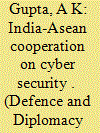

|
|
|
| 10 |
ID:
131187


|
|
|
|
|
| Publication |
2014.
|
| Summary/Abstract |
The military role's in US foreign policy over the next few years is to be underscored by capacity building abroad and complemented with direct action when necessary, US president Barak Obama said in a 28 May speech.
|
|
|
|
|
|
|
|
|
|
|
|
|
|
|
|
| 11 |
ID:
147527
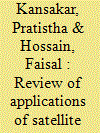

|
|
|
|
|
| Summary/Abstract |
Remotely sensed data can be used to understand and devise measures to address important global issues such as climate change, disaster and disease outbreak. National Aeronautics and Space Administration (NASA) is one of the largest producer and gatekeeper of satellite earth observation (EO) data that plays a crucial role in ensuring that these resources are used for solving global societal problems. However, the extent of remote sensing application is highly disparate in different parts of the world. This paper provides a general overview of key societal applications that have been enabled globally with the use of EO data. It also summarizes the impact of various NASA-supported programs for promoting applications on the targeted beneficiary communities. The themes addressed here are land cover/land use mapping, carbon biomass assessment, food security, disaster management, water resources, ocean management and health and air quality. The paper also argues for capacity building that is crucial to building sustainable solutions when using EO data for science-based decision making.
|
|
|
|
|
|
|
|
|
|
|
|
|
|
|
|
| 12 |
ID:
141900
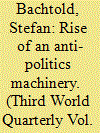

|
|
|
|
|
| Summary/Abstract |
Results’, ‘value for money’, ‘effectiveness’ and similar buzzwords have become commonplace in development cooperation and peace building. The use of technical instruments such as project cycle management and evaluations is hardly questioned anymore: these are presented as a minor shift of focus to make current practice more effective. This paper argues that there is far more to this shift: a machinery of practices and institutions has been installed that removes political questions on development or peace from the political realm and places them under the rule of technical experts. Drawing on a Foucauldian understanding of discourse analysis, the paper analyses how this machinery prioritises gradual reform, subjugates other approaches to societal change and reproduces power/knowledge networks in both the global South and North. Based on ethnographic field research in Myanmar, it also explores discursive strategies of local actors and assesses how they are aiming to create spaces to challenge this machinery.
|
|
|
|
|
|
|
|
|
|
|
|
|
|
|
|
| 13 |
ID:
133248
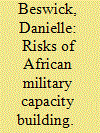

|
|
|
|
|
| Publication |
2014.
|
| Summary/Abstract |
Civil war and insecurity are widely seen as obstacles to development and threats to international stability, and donors are therefore keen to develop African capacities to manage conflict on the continent. Building the capacity of African militaries is hazardous, however, given their frequent roles in coups, support for authoritarian regimes, and violence against civilians. This article argues that the risks of military capacity building can be assessed more accurately by understanding how national governments view and utilize the military as a policy tool. It demonstrates this using the case of post-genocide Rwanda, a significant contributor to African peacekeeping but also to instability in the Democratic Republic of Congo (DRC). The article identifies four features of the Rwandan regime's understanding and use of military force, using these to explain the dual and divisive role of Rwanda's military as an agent of instability on the one hand and peace on the other. Finally, the article explores the M23 crisis, considering implications for donor efforts to manage risks inherent in international commitments to "African solutions". It concludes by arguing that, as African military capacity building continues, recognizing the ways in which such enhanced forces are likely to be used will be crucial to developing a better understanding of the continent's peace and security prospects.
|
|
|
|
|
|
|
|
|
|
|
|
|
|
|
|
| 14 |
ID:
109121
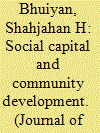

|
|
|
|
|
| Publication |
2011.
|
| Summary/Abstract |
This article explores the role of social capital in community development by focusing on two South Asian case studies drawn from India and Bangladesh. Both studies recognized social capital as a useful resource, which facilitates social interaction and promotes mutual support and cooperation and thus improves participants' livelihood through income generation, better community governance and capacity building. An important observation is that social capital yields superior outcome if it is used in line with the local conditions of a given society. The findings suggest lessons for policy planners, donor agencies, development practitioners, non-governmental organizations (NGOs) and civil society to use social capital as a resource in order to achieve sustainable community development.
|
|
|
|
|
|
|
|
|
|
|
|
|
|
|
|
| 15 |
ID:
173362
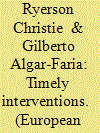

|
|
|
|
|
| Summary/Abstract |
While there has been a long engagement with the impact of time on peacebuilding policies and practice, this engagement has to date focused predominately on issues of short- versus long-term initiatives, and of waning donor support for such initiatives. More recently, the critical peacebuilding turn has focused attention on the politics of the everyday as being essential to emancipatory endeavours enacted through localisation. Yet despite this, time itself has not been the subject of analysis, and the politics of time have not been integrated into the study of peacebuilding. This article, drawing both on historical institutionalist and on critical international studies analyses of temporality, provides a framework for analysing the impacts of time on the potential to achieve emancipatory peace. Drawing on extensive fieldwork in Bosnia and Herzegovina and in Cambodia, this article asserts that a focus on Policy Time, Liberal Political Time, and Intergenerational Time highlights how peacebuilding initiatives are framed by disparate timescapes that limit the visibility of local chronopolitics, and that this in turn restricts local empowerment and resistances.
|
|
|
|
|
|
|
|
|
|
|
|
|
|
|
|
| 16 |
ID:
147523
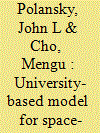

|
|
|
|
|
| Summary/Abstract |
Since 2011 the number of satellites less than 50 kg launched annually has increased by an order of magnitude. This trend is driven in part by proliferation of small satellite and lean satellite projects worldwide. In this decade alone, over 30 new countries are expected to achieve their first satellite in space. More than ever before, emerging countries are engaging in space-related activities. However, barriers such as lack of funding and underdeveloped human resources prevent many emerging nations from initiating or sustaining space programs. Kyushu Institute of Technology (Kyutech) has played an active role in space-related capacity building and international cooperation since 2009, then partnering with the United Nations Office for Outer Space Affairs to formulate a long-term fellowship programme hosted at Kyutech. Growing out of the success of the fellowship programme, Kyutech began significantly expanding its space-related capacity building project in 2013. This paper gives an overview of Kyutech's university-based model to enhance space-related capacity building and human resource development in emerging countries worldwide, and discusses advantages and disadvantages of alternative approaches.
|
|
|
|
|
|
|
|
|
|
|
|
|
|
|
|
| 17 |
ID:
137879
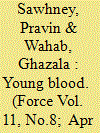

|
|
|
|
|
| Summary/Abstract |
The contradiction inherent in this statement is reflective of the society, where young people with the promise of a life ahead are willing to die an ignominious death in street protests but not express his or her opinion freely and be counted. Just as in the streets, in private conversations people want to go along with the mob, reluctant to take a position. Or maybe they are scared to even feel something which doesn’t have the consent of the mob. So how does one explain this? You are not scared of death, but you are scared of expressing yourself or saying no to the mob?
|
|
|
|
|
|
|
|
|
|
|
|
|
|
|
|
|
|
|
|
|